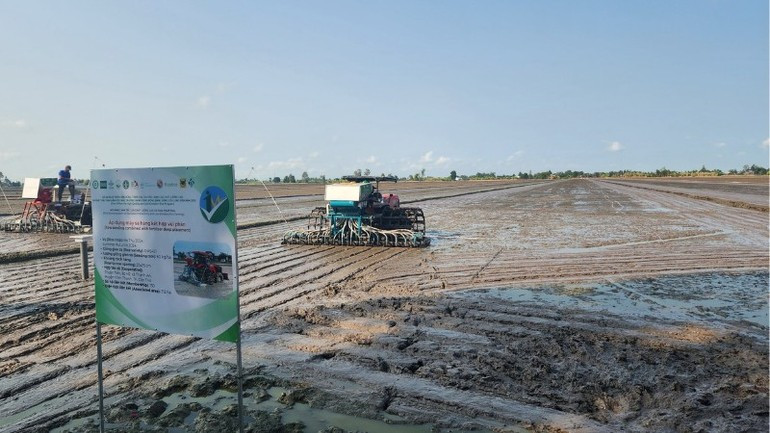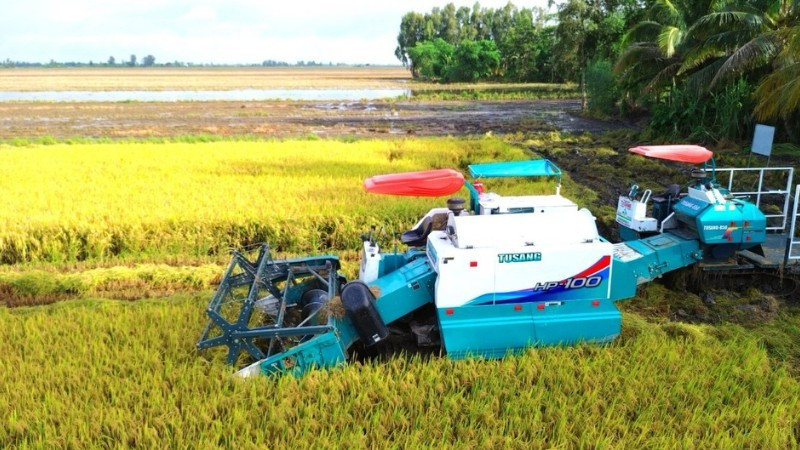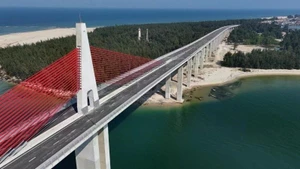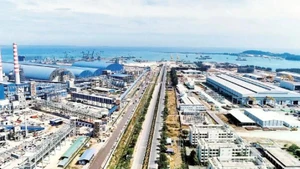Can Tho City has been assigned to implement 170,000 ha of production areas under the Project “Sustainable development of one million hectares of high-quality, low-emission specialised rice associated with green growth in the Mekong Delta by 2030”, approved by the Prime Minister. In 2025, the city will implement 104,500 ha, with the participation of 191 cooperative groups and cooperatives.
Since 2024, the city has deployed 12 pilot models (50 ha/model) achieving positive outcomes: reducing 40-50% of the amount of seeds sown, reducing over 30% of nitrogen fertiliser, reducing 2-3 times of spraying pesticides; productivity increased by 0.3-0.7 tonnes/ha, profit increased by at least 20% compared to traditional farming.
At the same time, greenhouse gas emissions decreased by 2–12 tonnes of CO₂/ha, contributing significantly to green and sustainable agricultural development.
The main support measures focus on technology transfer, production linkages, and the application of digital technology to optimise cultivation processes.
The city has organised specialised training and guidance for farmers to adopt sustainable farming processes to reduce input costs, including: instructing farmers to apply the measures "three reductions, three increases" and "one must, five reductions" to significantly reduce the amount of seeds sown, reduce the amount of nitrogen fertiliser, and reduce the number of times of spraying pesticides (two-three times). The city is also applying the Alternate Wetting and Drying (AWD) technique on more than 70% of the area participating in the project, helping reduce water consumption and greenhouse gas emissions (mainly methane); supporting farmers to process straw after harvest instead of burning it, turning straw into organic fertiliser or raw materials for the circular economy (such as mushroom cultivation), helping reduce environmental pollution.

Functional departments are applying MRV (Measurement – Reporting – Verification) procedures and digital technologies so farmers can monitor and record farming practices and evaluate reductions in CO₂ emissions on their rice fields. Farmers are supported in mechanisation application at nearly all stages, especially the use of drones for pesticide spraying, fertilising, and sowing, helping improve precision and reduce environmental impact.
As one of the first cooperatives to participate in the high-quality, low-emission rice cultivation model, Nguyen Cao Khai, Director of Tien Thuan Agricultural and Service Cooperative in Thanh Quoi Commune (Can Tho), shared that thanks to cultivation processes, technical support, and modern machinery, high-quality, low-emission rice cultivation has proved its effectiveness.
However, for this cultivation model to be sustainable, farmers, and cooperatives need preferential credit support to invest in mechanisation and contract-based product purchasing to ensure stable output.
Despite preferential policies, the lack of credit packages makes it difficult for farmers, cooperatives and businesses to access preferential loans to invest in mechanisation (rice transplanters, harvesters, straw-handling equipment) and technology (measuring devices, sensors).
Many cooperatives are not strong enough and lack the administrative and technical capacity to play a core role in building large raw material areas and closely linking with businesses.
In addition, some localities and farmers still do not fully understand or are overly focused on the sale of carbon credits without strictly implementing high-quality, low-emission cultivation processes, affecting the model’s sustainability.
Nguyen Thi Giang, Deputy Director of Can Tho City’s Department of Agriculture and Environment, said that in addition to providing technical and machinery support to cooperatives and cooperative groups, Can Tho City needs to focus on reorganising production according to the value chain, and linking with enterprises to purchase products in the form of public-private partnership (PPP), connecting cooperatives with large enterprises to sign contracts to purchase products at a higher price than normal rice.
The city authorities are coordinating with the Viet Nam Bank for Agriculture and Rural Development and other credit institutions to offer preferential loan packages for farmers and cooperatives to invest in machinery, equipment and new technologies for high-quality, low-emission rice production. The city is also implementing a reward payment mechanism (financial rewards) for farmers who change cultivation practices and achieve measurable reductions in CO₂ emissions, helping farmers earn additional income from carbon credits along with rice sales.
















